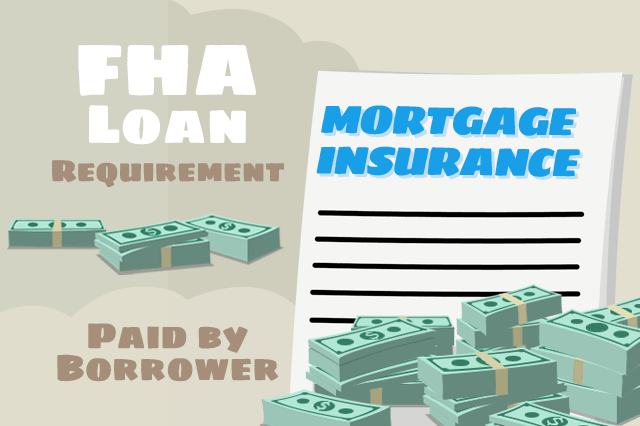FHA Loans and Mortgage Insurance Requirements

Conventional mortgages require private mortgage insurance (PMI) unless the borrower makes a specific, lender-prescribed percentage down payment that eliminates the need for the insurance. Such requirements vary depending on the financial institution.
FHA mortgage loans are different. They require a minimum 3.5% down payment for most transactions; borrower credit score issues may require a higher down payment depending on a set of variables including lender requirements and the borrower’s credit history.
FHA mortgage loans don’t require PMI, but they do require an Up Front Mortgage Insurance Premium and a mortgage insurance premium (MIP) to be paid instead. Depending on the terms and conditions of your home loan, most FHA loans today will require MIP for either 11 years or the lifetime of the mortgage.
FHA mortgage insurance is not the same as private mortgage insurance, and borrowers should discuss how FHA mortgage insurance premiums differ from conventional loan PMI if the borrower has concerns.
At one time, FHA loans allowed borrowers to cancel their mortgage insurance premium (MIP) once the Loan-To-Value ratio got to a certain point. But changes in FHA loan regulations eliminates this option.
The FHA Up-Front Mortgage Insurance Premium (UFMIP) is paid at closing time either in cash, or can be financed into the loan amount. You pay the entire amount at once whether you choose to finance the amount or pay in cash. You cannot partially finance the UFMIP, which is a standard closing cost for FHA mortgages.
The UFMIP is a one-time charge, the FHA mortgage insurance premium is included as part of your monthly mortgage payment, or is paid as the legally binding loan agreement dictates. The UFMIP is non-refundable UNLESS the borrower is refinancing into another FHA mortgage.
Budgeting and saving for the UFMIP and planning for the MIP in your monthly mortgage plans is critical. These expenses are based on the loan term, overall amount of the loan, loan-to-value ratio and other factors.
There is no set fee or specific cost outlined for borrowers to use as an estimate-you will need to estimate your base loan amount, the amount of your down payment (to establish the loan-to-value ratio) and other factors. It is best to speak to a loan officer about FHA mortgage insurance requirements and what’s reasonable to expect based on your transaction.
This type of mortgage insurance should not be confused with any additionally required hazard insurance you may need to proceed with the mortgage. FHA mortgage insurance is strictly to prevent losses incurred due to loan default/foreclosure.
------------------------------
RELATED VIDEOS:
You're Almost There When You Get Your Loan Approval
Learn About the Mortgage Insurance Premium (MIP)
Pre-approval Starts the Mortgage Process

Do you know what's on your credit report?
Learn what your score means.







